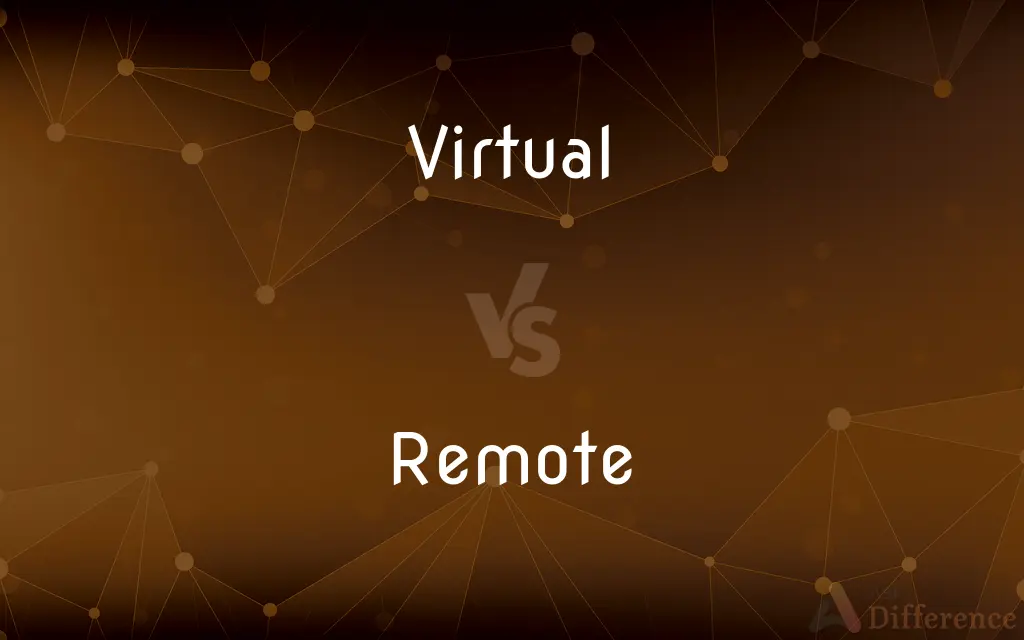Virtual vs. Remote — What's the Difference?
By Urooj Arif & Maham Liaqat — Updated on April 7, 2024
Virtual work often involves simulated environments or operations, mainly online, whereas remote work means performing job duties away from a central office, but not necessarily online.

Difference Between Virtual and Remote
Table of Contents
ADVERTISEMENT
Key Differences
Virtual work or activities are carried out in a simulated environment or through computer-mediated platforms, focusing on the use of digital tools to replicate real-world processes. This type of work is highly reliant on technology for communication, collaboration, and execution of tasks. On the other hand, remote work refers to the practice of performing job duties from a location other than a central office, which can be home, a coworking space, or any other place outside of the traditional office environment.
For instance, virtual meetings use software like Zoom or Teams to simulate an in-person meeting environment, allowing participants from various locations to interact as if they were in the same room. Remote work emphasizes the geographical independence of the worker, relying on digital communication tools to stay connected with team members and manage tasks. While it necessitates the use of technology for communication, the term itself is more about the physical location of the worker than the technological means used for job execution.
Virtual experiences or tasks often require specific software or platforms designed to create a simulated environment. For example, virtual reality (VR) applications immerse users in a digitally constructed world, offering interactive experiences that mimic real-life settings or fantastical landscapes. These experiences are primarily designed for training, entertainment, or education, leveraging advanced technology to engage users in a fully digital environment. In contrast, remote work may utilize a variety of tools and technologies to facilitate job responsibilities but does not inherently involve creating or participating in a simulated environment. Remote workers use tools like email, cloud services, and project management applications to accomplish their tasks, which may or may not involve innovative or immersive technologies. The focus is on the ability to perform work duties effectively from a distance, rather than on the creation or use of virtual spaces.
While virtual work can include elements of remote work, especially when it involves team members collaborating from different locations, its defining characteristic is the creation or use of digital simulations to achieve its goals. Whether for training, meetings, or collaborative projects, virtual work often seeks to replicate aspects of the physical world within a digital space, enhancing the sense of presence and interaction among participants. Remote work, however, prioritizes the geographical flexibility of the workforce, allowing individuals to work from anywhere with an internet connection. This flexibility can lead to increased employee satisfaction and productivity, as well as reduced overhead costs for businesses. The key distinction lies in the focus on physical location versus the technological environment used to conduct work.
Comparison Chart
Environment
Digital or simulated
Any location outside the office
ADVERTISEMENT
Technology
Advanced, often immersive
Standard digital communication tools
Purpose
To replicate or enhance real-life scenarios
To perform job duties from afar
Key Tools
VR platforms, simulation software
Email, cloud services, video conferencing
Interaction
Can be highly interactive and immersive
Primarily through digital communication
Compare with Definitions
Virtual
Relating to the online world.
Virtual currencies like Bitcoin have become popular.
Remote
Operating or controlled from a distance.
Remote control devices simplify home entertainment.
Virtual
Performed or operated by means of a computer.
Virtual assistants help with online tasks.
Remote
Having very little connection with or relationship to.
The remote island was untouched by modern technology.
Virtual
Involving the use of computer technology to create a simulated environment.
Virtual reality games offer immersive experiences.
Remote
Distant in space or time.
The possibility of an office return seems remote in the digital age.
Virtual
Not physically existing but made to appear so by software.
Virtual meetings can connect people worldwide.
Remote
Situated far from the main centers of population.
Remote work allows living in quieter, rural areas.
Virtual
Existing in essence or effect though not in actual fact.
A virtual office serves as a company’s online presence.
Remote
(of work) Done away from a central office or location.
Remote jobs offer flexibility and autonomy.
Virtual
Existing or resulting in essence or effect though not in actual fact, form, or name
The virtual extinction of the buffalo.
Remote
Located far away; distant in space.
Virtual
Existing in the mind, especially as a product of the imagination. Used in literary criticism of a text.
Remote
Hidden away; secluded
A remote hamlet.
Virtual
Existing as or by means of digital media
A virtual classroom.
Remote
Distant in time
The remote past.
Virtual
Relating to or existing in virtual reality
A virtual encounter in a chatroom.
Remote
Faint; slight
A remote possibility.
Had not the remotest interest.
Virtual
Emulating the function of another system or device.
Remote
Far removed in connection or relevance
A cause remote from everyday concerns.
Virtual
In effect or essence, if not in fact or reality; imitated, simulated.
In fact a defeat on the battlefield, Tet was a virtual victory for the North, owing to its effect on public opinion.
Virtual addressing allows applications to believe that there is much more physical memory than actually exists.
Remote
Distant in manner; aloof.
Virtual
Having the power of acting or of invisible efficacy without the agency of the material or measurable part; potential.
Remote
Operating or controlled from a distance
Remote sensors.
Virtual
Nearly, almost. (A relatively recent development in meaning)
The angry peasants were a virtual army as they attacked the castle.
Remote
(Computers) Located at a distance from another computer that is accessible by cables or other communications links
A remote terminal.
Virtual
Simulated in a computer or online.
The virtual world of his computer game allowed character interaction.
Remote
A radio or television broadcast originating from a point outside a studio.
Virtual
Operating by computer or in cyberspace; not physically present.
A virtual assistant
A virtual personal trainer
Remote
A remote control device.
Virtual
Capable of being overridden with a different implementation in a subclass.
Remote
At a distance; disconnected.
A remote operator may control the vehicle with a wireless handset.
Remote workers
Virtual
(physics) Pertaining to particles in temporary existence due to the Heisenberg uncertainty principle.
Remote
Distant or otherwise inaccessible.
After his fall from the emperor's favor, the general was posted to a remote outpost.
Virtual
A virtual member function of a class.
Remote
(especially with respect to likelihood) Slight.
There was only a remote possibility that we would be rescued as we were far outside of the regular shipping lanes.
They have a very remote chance of winning.
You have a remote resemblance to my grandmother.
Virtual
(gambling) A computer simulation of a real-world sport such as horse racing.
Remote
Ellipsis of remote control
I hate it when my uncle comes over to visit; he always sits in the best chair and hogs the remote.
Virtual
Having the power of acting or of invisible efficacy without the agency of the material or sensible part; potential; energizing.
Heat and cold have a virtual transition, without communication of substance.
Every kind that lives,Fomented by his virtual power, and warmed.
Remote
(broadcasting) An element of broadcast programming originating away from the station's or show's control room.
Virtual
Being in essence or effect, not in fact; as, the virtual presence of a man in his agent or substitute.
A thing has a virtual existence when it has all the conditions necessary to its actual existence.
To mask by slight differences in the manners a virtual identity in the substance.
Remote
(computing) To connect to a computer from a remote location.
Virtual
Being actually such in almost every respect;
A practical failure
The once elegant temple lay in virtual ruin
Remote
Removed to a distance; not near; far away; distant; - said in respect to time or to place; as, remote ages; remote lands.
Places remote enough are in Bohemia.
Remote from men, with God he passed his days.
Virtual
Being such in essence or effect though not in actual fact;
A virtual dependence on charity
A virtual revolution
Virtual reality
Remote
Hence, removed; not agreeing, according, or being related; - in various figurative uses.
Remote
Separated by intervals greater than usual.
Remote
A device that can be used to control a machine or apparatus from a distance;
He lost the remote for his TV
Remote
Far distant in space;
Distant lands
Remote stars
A remote outpost of civilization
A hideaway far removed from towns and cities
Remote
Very unlikely;
An outside chance
A remote possibility
A remote contingency
Remote
Far distant in time;
Distant events
The remote past or future
A civilization ten centuries removed from modern times
Remote
Inaccessible and sparsely populated
Remote
Far apart in nature;
Considerations entirely removed (or remote) from politics
Common Curiosities
What is remote work?
Remote work is the practice of performing job duties from a location outside of a traditional office environment, using digital communication tools.
How do virtual and remote work differ in terms of environment?
Virtual work creates a simulated digital environment, while remote work can be performed in any physical location outside of an office.
Can virtual work be considered a form of remote work?
Yes, virtual work can be considered a form of remote work when it involves team members collaborating from different locations, despite its focus on simulated environments.
What is virtual work?
Virtual work involves tasks or meetings that occur in a digital or simulated environment, using technology to replicate real-world interactions.
What technologies are commonly used in virtual work?
Technologies like virtual reality platforms and simulation software are commonly used in virtual work to create immersive experiences.
Can virtual work be used for training purposes?
Yes, virtual work is often used for training, providing realistic simulations that can enhance learning and skill development.
Is remote work suitable for all job roles?
Not all job roles are suitable for remote work, particularly those requiring physical presence or access to specific equipment.
Is virtual work more technology-dependent than remote work?
Yes, virtual work is more technology-dependent, often requiring advanced or immersive technologies, unlike the standard tools used in remote work.
Do virtual experiences always require virtual reality technology?
While virtual experiences often utilize virtual reality technology for immersion, they can also include other forms of digital simulations.
What tools do remote workers typically use?
Remote workers typically use digital communication tools like email, video conferencing, and cloud services.
What are the benefits of virtual meetings?
Virtual meetings can connect participants globally, offering convenience and saving time and travel costs.
How do virtual environments enhance collaboration?
Virtual environments can enhance collaboration by providing interactive and immersive ways for team members to engage and work together despite geographical distances.
Can remote work improve work-life balance?
Remote work can improve work-life balance by offering flexibility in work location and hours, potentially leading to greater job satisfaction.
What challenges can arise from remote work?
Challenges of remote work can include feelings of isolation, difficulties in communication, and the blurring of work-life boundaries.
How does remote work benefit employers?
Remote work can reduce overhead costs for employers and allow access to a broader talent pool.
Share Your Discovery

Previous Comparison
Internship vs. Residency
Next Comparison
Godzilla vs. SonicAuthor Spotlight
Written by
Urooj ArifUrooj is a skilled content writer at Ask Difference, known for her exceptional ability to simplify complex topics into engaging and informative content. With a passion for research and a flair for clear, concise writing, she consistently delivers articles that resonate with our diverse audience.
Co-written by
Maham Liaqat












































